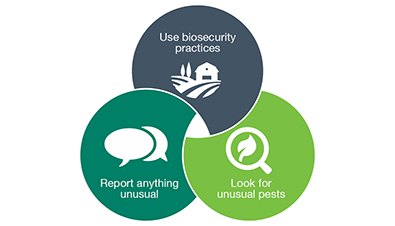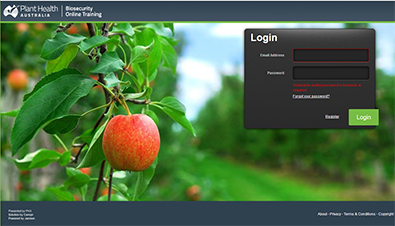Read the latest information on
Foot-and-mouth disease
 There’s a new course available on Plant Health Australia’s Biosecurity Online Training (BOLT) site on the topic of reporting new pests and diseases, and some of the steps that may be taken in the early stages of an incursion.
There’s a new course available on Plant Health Australia’s Biosecurity Online Training (BOLT) site on the topic of reporting new pests and diseases, and some of the steps that may be taken in the early stages of an incursion.
The Pest Reporting and Responses course – focussing on a grower’s role in reporting and responses – provides information on how to report and what may happen after you do. The course also includes the responsibilities of governments and industries in the early part of a pest incursion.
The course is free, takes around 15 minutes to complete and there’s no assessment. Once you are registered as a BOLT user, you can simply read the information.
Plant pests can have a serious impact on your business, industry and community. By playing your part and reporting anything unusual, you can help reduce the chance that a new pest is here to stay. That’s because the earlier you report, the more likely it is that a pest can be eradicated.
In Australia, any unusual plant pest should be reported as soon as possible to the relevant state or territory agriculture agency through the Exotic Plant Pest Hotline on 1800 084 881.

Register on BOLT with a user name and password, confirm your registration, and then you can do the Pest Reporting and Responses course.
As they say, prevention is better than cure, so implementing biosecurity practices can help to prevent the entry and spread of exotic pests and diseases. A more immediate threat may in fact be from regionalised pests that are already in the country but confined to specific growing regions and subject to quarantine or official control measures.
At last count* there are 77 regionalised pests in Australia which could really affect your bottom line of you had to deal with them on top of the usual array of pests and diseases.
It can be a worrying time, but reporting will allow you to get support, knowledge and advice from your state or territory agriculture department and your industry organisations. This is the best way to:
If you want to find out more about what happens after you call and actions you could take to minimise impacts to your property, complete the Pest Reporting and Responses course.
It’s available from the Plant Health Australia Biosecurity Online Training site at www.planthealthaustralia.com.au/BOLT
A fact sheet summarising some of the key information from the course can be downloaded here.